- Home
- Kathryn Lasky
A Journey to the New World Page 5
A Journey to the New World Read online
Page 5
I came topside because I was having a bit of the quissies and felt that the sharp cold air might help. The night was strangely beautiful. ’Tis never quite pitch-black any longer, not since the ice came and coated everything. For indeed though it is only a quarter moon and the night vapors hang with mist, the ice doth catch any light, including the whiteness of the mist. This doth turn our decks into a time of perpetual twilight. In the gloaming of the dim moon on the iced rigging I noticed something move on the seaward rail. Thinking it was a sailor at first, I paid it no heed, but then I heard a whimpering. I knew ’twas Dorothy Bradford for that is a sound I have heard her make before. She was hunched against the rail and I can now clearly see her back shake with sobs. I wondered to myself if I should go over and try to comfort her, but I hesitated for with some folks who are so grieved ’tis best that they be left alone. But just as I was wondering, perhaps I blinked, I do not know, but I heard a thud and then a second later a splash. She had done slipped right under the rail! ’Tis easy to do. One must be very cautious on the icy deck. I sprang across the deck in horror and indeed I fell flat, smashing my chin. I shrieked, got up, and went to the rail to look over. I saw her skirts billow on the water. Within seconds there were sailors and others.
“Someone over the side!”
“Man overboard!”
They lowered the longboat. It took them several minutes. I do not know how long really. I quickly slipped away. I cannot stop wondering if I somehow could have stopped all this. The poor woman so distracted and all, never minding her footing. I should have gone and talked to her but I was so afraid of disturbing her. And now she will never ever again see her dear son and he shall never see his dear mother.
Love,
Mem
December 10, 1620
Cape Cod Harbor
Dear Imp,
I wonder what Master Bradford will think when he returns from the third exploration. Poor man. ’Tis a sad time aboard our ship now.
My only joy be in seeing Lark with John Alden. They appear to be most gloriously separate from all the darkness, all the rancor and the petty gossip. A different climate doth swirl about them. Was it ever this way perhaps for Dorothy and William Bradford? How can things go so wrong when love is so bright?
Good night and love,
Mem
December 13, 1620
Cape Cod Harbor
Dear Imp,
Good news, at last! Father and the men returned last evening and indeed they have found a new place, superior to this one. He was in such a rush to describe the trip and this new region that he could hardly get the words out fast enough. First, they set into a bay beyond the headland where they saw many of the largish cousins to the whales, called Grampus fish, and thusly decided to name this place Grampus Bay. I do feel that one of the finest things about coming into this New World is that we can become namers of places and the words be most colorful and full of our own imagination.
Once there, the men divided up, some staying with the shallop, others going ashore. Amongst the shore men was my father. They followed the track of the Indians and found a great burial site, but they did no digging. As they continued they also found Indian dwellings, but no Indians. They made their camp but were wary, for they felt the presence of the Indians about even if they could not see them. Their camp was near the beach where the shallop with the other men had now put in.
On toward morning, when they were making their way down to that beach, arrows suddenly came raining down upon them! At last Myles Standish’s worst fears were realized. Most of the men, though, had left their arms some yards away. So they ran with all speed to recover them. In the meantime Captain Standish held off the feathered men with his flintlock musket. Then men down at the shallop had begun firing their pieces but we heard them calling for a firebrand to ignite the rest. So Father himself took a log from the campfire and ran with it blazing toward the beach. None of this did anything to discourage the Indians. They were, according to Father, “valiant and lusty.”
No one yet had been shot or pierced by an arrow but at length one of the Indians gave a fierce cry and they all began to run away. The men followed, shouting and still shooting off their muskets. This they did to show the Indians that they were neither afraid nor discouraged. They called this site of the combat The Place of the First Encounter. I, personally, do not think this a fitting name. I would lief call it The Place of Fire and Arrows, or some such.
They all continued on in the shallop. The wind stiffened and the waters grew troublesome. But God did again deliver these men to a safe harbor on an incoming tide. There be an island under which they took shelter. And although the sea was studded with rocks all about, again Divine providence guided them to the one sandy patch in which to put down their anchor. This be Saturday, December 10.
The next day being the Sabbath they rested and the next on Monday they sounded the harbor and found it to be most excellent. Then ashore they explored and found good tillable land and many running brooklets. This place they deemed was perfect for our company. They be calling it Plimoth after that place from which we set out in England long months ago. And tomorrow we weigh anchor to go forth to our new home. And this be it, this truly be it.
Love,
Mem
December 15, 1620
Cape Cod Harbor
Dear Imp,
We weighed anchor this morning but soon had turned back as we could not make the harbor because of a northwest wind and our course lies west. ’Twas like a big fist in our face. We put in again at Cape Cod Harbor. Need I say that this part of the New World is starting to look old.
We try again tomorrow.
Love,
Mem
Plimoth
December 16, 1620
Plimoth Harbor
Dear Imp,
We are now fast in Plimoth Harbor after being so long in the other place that I cannot stand to write its name again. But now at the top of my entries I can write Plimoth Harbor, and this I do not think I shall ever grow tired of. For it seems fairer than the other place from all I see and hear and this truly be the site of our permanent settlement. ’Tis exciting to think that this is where I shall someday marry and have my children and their children have children and so on through the years and into the new centuries — I pray.
I am anxious to go ashore. I know I shall need much patience for t’will be a long time coming before this settlement be built, before we have a house of our own.
Patience, I must pray for Patience.
Love,
Mem
December 18, 1620
Plimoth Harbor
Dear Imp,
It is one minute after midnight. The Sabbath is over, so now I can write. I did pray for Patience and it did not come! In fact, I am more impatient than ever. You see, nobody could, of course, go ashore on Sabbath. So now, today, a party shall land. But first only a few sailors and men. No women and children. And to add to this frustration there is all this dispute about where they should build the settlement — near the bay, close to the good fishing, or up yonder where ’tis best for planting. Then they talk about how we must build in the most profitable place. Because of our contract with the merchants who gave us money for this trip we must raise much crop and salable goods to send back to pay our debt.
I understand none of this. I just want to get ashore. Hummy and I want to look for lots near each other, so we might be neighbors when finally we get to build our own houses. They promise that tomorrow the women and children shall be brought ashore.
Impatiently yours, Imp,
Mem
December 18, 1620. Afternoon
Plimoth Harbor
Dear Imp,
I be so angry I could burst. As we were landing, I fell off the huge stepping rock into the water. More accurately I was shoved. Three guesses who? Johnny and Francis Billington, the scummy little bilge rats! But there is another culprit as well. Air Nose! I simply detest that girl.
H
ere is how it happened. First Mate Clark was coming for a load of us children and women and he had the longboat. But the tide had flooded in so we could not land so far up on the beach. There be this immense rock a ways down, perfect for putting people ashore on. Well, me and Hummy and Mistress Air Nose were sitting in the stern of the longboat. The Billingtons were sitting in the bow. They always crowd for the bow. So shovey are they and always wanting to be the first pointing into the breeze and they hang over the gunwales dragging their hands in the water, just like Master Jones and First Mate Clark always tell them not to.
Anyhow, the wind and the currents being such, just before we reach the rock Master Clark swings the longboat stern to because he says it makes for a safer landing. So indeed it appears that Hummy and I shall be the first on the rock. We are right there, closest to it. But then Air Nose suddenly sees an opportunity. So she starts edging up. I am surprised to see her pinched little face coming up under my elbow. I think, what is she doing here? But then I see it writ on her face. History beckoned! She wanted to be the first white child to set foot at Plimoth, and this rock was the piece she could claim that would assure her that place in history for ever and a day.
Think about it. If the tide would have been right and we could have landed on the beach, well we would have all climbed out more or less at the same time. But this rock, large but small enough to only accommodate a few, changed all that. It gave a truly specific place that their stupid feet could set down on. The place could be memorialized and stupid old Mary Chilton will have her name forever linked to this chunk of rock. She’ll probably have her stupid grandchildren build a stupid statue to her here.
Well, it was not quite to be because before I knew it there was Francis Billington pushing his face up beneath my elbow, too. We were half out of the boat and half on the rock. I didn’t know whose foot was first on the rock. There was one moment when I saw mine and Air Nose’s and a Billington boot. But I felt Air Nose’s elbow in my ribs and then I felt this huge shove from behind and I went flying off the rock into the water. Not deep mind you. My skirt was only half wet but when I picked myself up I saw Air Nose standing, posing really, on the rock. Master Clark had actually thrown Johnny Billington onto the beach and he had Francis by his collar, dangling him over the gunwales. And then he roared at all of us, “And they call you Christian children!” But old Air Nose just preened. I am praying very hard not to ever speak out loud the following thought, but I must say it or I shall explode. So I shall write it very very small: I hope Mary Chilton almost dies a long and painful death and then recovers but is left just slightly crippled.
Love,
Mem
December 21, 1620
Plimoth Harbor
Dear Imp,
Violent storms. Wind tears through the rigging. Some pilgrims be on land with no victuals. They hope to put out the shallop later to send in provisions. We now ride on three anchors so turbulent be the seas.
Love,
Mem
December 23, 1620
Plimoth Harbor
Dear Imp,
Mistress Allerton was delivered of a dead-born son last evening. They wrapped him up and put him in a small box and today we took him ashore to bury him. Winds have abated so we all go ashore today to begin some work. Men have begun felling timber. Hummy and I walked about looking for where we would most want to put our houses. Then Air Nose came along and said that her family had already picked their place and that they would probably be allowed first choice in allotment because of something to do with her father being such a distinguished tailor back in Canterbury. And then she says something about how important he and her mother were back in Canterbury, suggesting they were almost nobles. And I know this to be a bucket of pig slops because none of us on the Mayflower belong to those high ranks. We all be but humble, simple folk — some educated like Master Bradford and Elder Brewster, some not. So I do not know where she gets to talking in this high manner. I say to her, “Mary Chilton, if your parents get their allotment first it not be because they are so high and mighty and special. It only be because they are exactly like you—low and pushy.” She screamed and ran off and Hummy turned so pale her freckles did stand out like pebbles!
Love,
Mem
December 24, 1620
Plimoth Harbor
Dear Imp,
Yesterday when we returned to the ship, we heard of another death, a man that I hardly knew but it still seems nonetheless sad. Many of us are becoming ill. There be two sailors, one the quartermaster and the other the cook, who have also gone on. ’Tis brutal to get cold and wet as nearly all have at some point. Since this harbor be so shallow and we be more than a mile from the shore we often get drenched going in. And Father says we are not well nourished after so long without fresh food and that the illness they call scurvy is seizing upon us. So six have died this month. Mam and Father do not let me go ashore today as there is a cold wet wind and there have been cries of Indians heard. So Captain Standish has posted an extra guard. I pray, dear Imp, that none of my family falls to this illness, nor Hummy.
Love,
Mem
December 25, 1620
Plimoth Harbor
Dear Imp,
Today work begins on the Common House and a platform is built atop the hill for fortification. The cannon has already been put ashore. Captain Standish supervises that. The men cut and fell logs.
Those like Father who are skilled with saws and drawknives rive and split and shape the logs. We children have been given a job, too. We walk along the shore and look for roof thatch. Though many of us be weak and tired we do this with great spirit. For the sooner the Common House is built, the sooner our own houses may be built and we shall have shelter from the winter and no more trips back and forth to the Mayflower.
The sailors and many of the Strangers do not understand how we can work on Christmas day. But it is not the Sabbath so we may work. Many of the sailors would prefer to drink their beer and make merry.
Love,
Mem
December 28, 1620
Plimoth Harbor
Dear Imp,
The allotments be marked out today. The ground was measured. I went along to watch them do it. They first decided how many families we actually be amongst our company, so they might calculate the number of dwellings to be built. It was decided that all single men with no families be included in the house of another. I do hope that perhaps we can have John Alden. I like him so, and then Lark would come to visit us a great deal.
To greater families were given larger lots, eight feet, or half a pole, in breadth and nearly fifty feet, or three pole in length. We do not qualify as a greater family. So our lot be the same in width but not quite so long at forty-five feet. I think this is fair. I am glad they decided to chop the length rather than the breadth. A narrow house makes me feel fairly tight and bound, as if I cannot breathe.
Love,
Mem
December 29, 1620
Plimoth Harbor
Dear Imp,
It is wet and cold today and brewing up to a storm. The people are sore to go to work. From the deck I can see columns of smoke rising from the Indian fires. Still I have yet to see an Indian.
Love,
Mem
December 30, 1620
Plimoth Harbor
Dear Imp,
More stormy weather. Too beastly for the men to work. Mam is very tired and coughs. I play with Blessing and I think I am getting better with the finger games for I seem to engage her longer.
Love,
Mem
January 1, 1621
Plimoth Harbor
So Dear Imp,
The year hath turned and I now write a new numeral on this page. But it leads me to wonder if we came at the wrong time of year for this task. Perhaps it would have been better if we had waited another year in Holland and left in the spring of 1621, so we could arrive in the summer. How shall we ever build anything here betwe
en the storms and all our people getting so sick. More have become ill. Work resumes today as there is a letup in the weather.
Love,
Mem
P.S. I have a most fierce craving for a warm slice of ginger cake, the kind the baker on Helmerstraat near the canal sells. This is not the first time I have thought of Holland, but it is the first time I have almost tasted it.
January 2, 1621 Plimoth Harbor
Dear Imp,
All I think of is ginger cake. I can now almost smell it, sometimes in my dreams!
The Common House proceeds well in its construction.
Love,
Mem
January 3, 1621
Plimoth Harbor
Dear Imp,
I am still having my ginger dreams and now Hummy, too, is thinking about ginger cake.
We told Mam. She laughed and then she got this strange grimace while she was laughing as if it hurt but was quick to cover it up. And I was not sure whether it be a physical pain or perhaps she, too, misses Leyden and wishes we had not come, at least not now.

 Felix Takes the Stage
Felix Takes the Stage Lucy
Lucy Lone Wolf
Lone Wolf Broken Song
Broken Song The Shattering
The Shattering The Crossing
The Crossing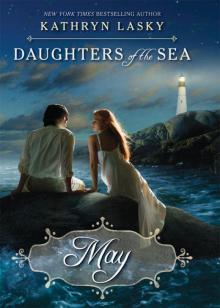 May
May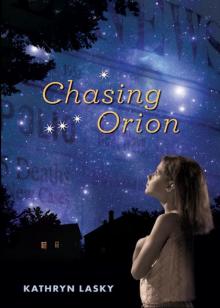 Chasing Orion
Chasing Orion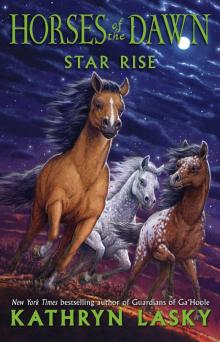 Star Rise
Star Rise The River of Wind
The River of Wind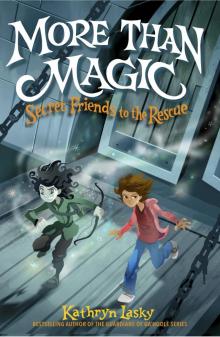 More Than Magic
More Than Magic Born to Rule
Born to Rule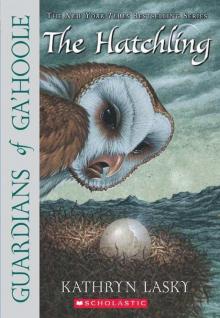 The Hatchling
The Hatchling The Rescue
The Rescue Marie Antoinette: Princess of Versailles, Austria - France, 1769
Marie Antoinette: Princess of Versailles, Austria - France, 1769 The War of the Ember
The War of the Ember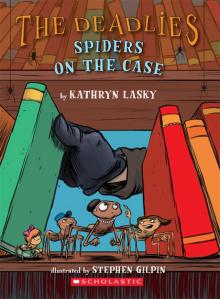 Spiders on the Case
Spiders on the Case To Be a King
To Be a King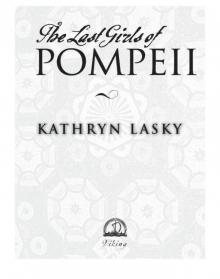 The Last Girls of Pompeii
The Last Girls of Pompeii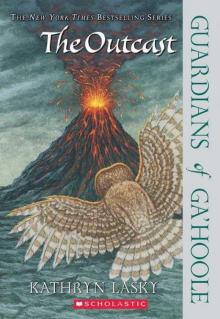 The Outcast
The Outcast Exile
Exile Night Witches
Night Witches Spirit Wolf
Spirit Wolf The Quest of the Cubs
The Quest of the Cubs Frost Wolf
Frost Wolf The Keepers of the Keys
The Keepers of the Keys The Extra
The Extra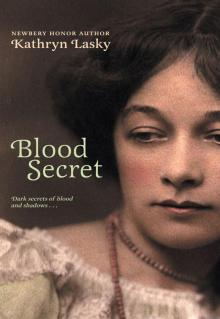 Blood Secret
Blood Secret Watch Wolf
Watch Wolf Blazing West, the Journal of Augustus Pelletier, the Lewis and Clark Expedition
Blazing West, the Journal of Augustus Pelletier, the Lewis and Clark Expedition The Capture
The Capture The Burning
The Burning The Journey
The Journey Unicorns? Get Real!
Unicorns? Get Real! The Escape
The Escape Star Wolf
Star Wolf Ashes
Ashes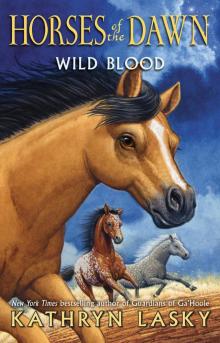 Wild Blood
Wild Blood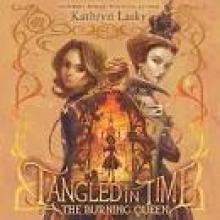 Tangled in Time 2
Tangled in Time 2 The Siege
The Siege Hannah
Hannah Elizabeth
Elizabeth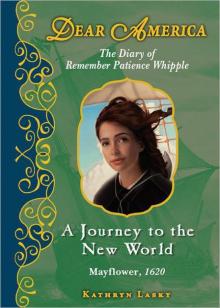 A Journey to the New World
A Journey to the New World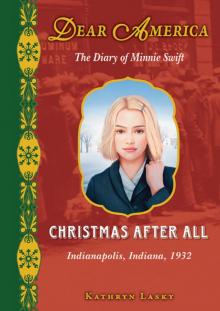 Christmas After All
Christmas After All Mary Queen of Scots
Mary Queen of Scots